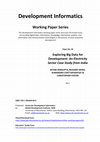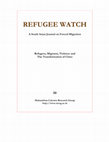Presentations by Ritam Sengupta
Presentation at the Symposium on Big Data and Human Development at the Oxford Internet Institute,... more Presentation at the Symposium on Big Data and Human Development at the Oxford Internet Institute, in September, 2016 as part of a panel discussing ‘Digging into big data and development: Findings from three Indian cases’.
My section of presentation made virtually spoke of the use of 'Big' data in the case of regulating theft and improving network by n electricity distribution company east India
A historical study of the coming into being of electrical laws in India and its relationship to i... more A historical study of the coming into being of electrical laws in India and its relationship to imperial capital. Presentation at Annual PhD Candidates' Work-in-Progress Presentation, February 2016, CSSSC
Presentation on the early history (early 20th century) of hydro-electric projects in colonial Ind... more Presentation on the early history (early 20th century) of hydro-electric projects in colonial India at the Anjan Ghosh Memorial Workshop, October, 2015 at CSSSC
A study of the history of India's Universal Service Obligation (in telecom) policy. Presented for... more A study of the history of India's Universal Service Obligation (in telecom) policy. Presented for the 'Lives of Information Workshop', February 2014, SARAI, CSDS New Delhi
Dissertation: by Ritam Sengupta
An ethnographic study of low-income cell-phone use primarily among domestic aid workers in Calcut... more An ethnographic study of low-income cell-phone use primarily among domestic aid workers in Calcutta. Unpublished MA Dissertation in Anthropology, SOAS, 2013
Projects by Ritam Sengupta
A study of recently introduced inititiaves of digitised production of electrical data in West Ben... more A study of recently introduced inititiaves of digitised production of electrical data in West Bengal as part of the 'Big Data for Development' research project of the Centre for Internet and Society, University of Manchester and the University of Sheffield
Publications by Ritam Sengupta

This paper presents exploratory research into data-intensive development that seeks to inductivel... more This paper presents exploratory research into data-intensive development that seeks to inductively identify issues and conceptual frameworks of relevance to big data in developing countries. It presents a case study of big data innovations in Stelcorp? a state electricity corporation in India. In an attempt to address losses in electricity distribution, Stelcorp has introduced new digital meters throughout the distribution network to capture big data, and organisation-wide information systems that store and process and disseminate big data. Emergent issues are identified across three domains: implementation, value and outcome. Implementation of big data has worked relatively well but technical and human challenges remain. The advent of big data has enabled some ?albeit constrained ?value addition in all areas of organisational operation: customer billing, fault and loss detection, performance measurement, and planning. Yet US$ tens of millions of investment in big data has brought no aggregate improvement in distribution losses or revenue collection. This can be explained by the wider outcome, with big data faltering in the face of external politics; in this case the electoral politics of electrification. Alongside this reproduction of power, the paper also reflects on the way in which big data has enabled shifts in the locus of power: from public to private sector; from labour to management; and from lower to higher levels of management. A number of conceptual frameworks emerge as having analytical power in studying big data and global development. The information value chain model helps track both implementation and value-creation of big data projects. The design-reality gap model can be used to analyse the nature and extent of barriers facing big data projects in developing countries. And models of power ?resource dependency, epistemic models, and wider frameworks ?are all shown as helping understand the politics of big data.
A more detailed version of the paper also came out as a working paper in Development Informatics at the University of Manchester, a copy from which is uploaded here
Edited Volume by Ritam Sengupta

Data Centres as Infrastructure: Frontiers of Digital Governance in Contemporary India, 2022
Data Centres (DCs) have emerged as the key infrastructure for amassing and processing the lifeblo... more Data Centres (DCs) have emerged as the key infrastructure for amassing and processing the lifeblood of the globalised digital economy—data. So far, the digital economy has been studied in terms of information technology labour, regimes of privacy or data protection, and the implications of living in an increasingly connected world.
Data Centres as Infrastructure goes beyond technical/business-oriented accounts of DCs and views them as both an object and a principle of governance in India, one of the world's most prominent rising markets for DCs. The authors understand DCs not just as technical infrastructure, but as political institutions that make and exercise new forms of power while negotiating state and capital in the postcolonial nation.
Taking a historical and sociological approach to DCs, this volume explores actual social contexts of policy-making and practice in relation to problems of digitalisation that inflect the way in which lives, commerce, and governance are shaped in India. Through case studies, the authors examine a ‘captive’ Data Centre deployed by the state-owned electricity discom— WBSEDCL, to highlight a specific techno-political issue—the theft of power and the ‘(un)management’ of its loss. The volume also examines the production of a new form of territoriality, economy, and polity in the Navi Mumbai area, known for being home to several large DCs. The Introduction highlights some of these concerns through a discussion of how the Indian state yields space to norms of corporatised governance while also enrolling new kinds of data-fied subjects through the Aadhaar project, demonetisation, and ‘data localisation’.
https://orientblackswan.com/details?id=9789354422652
Chapter in Edited Volume by Ritam Sengupta
Introduction The State in/of Data Centres in India, 2022
Intro: discusses state power in India as implicated in the peculiar control regimes characteristi... more Intro: discusses state power in India as implicated in the peculiar control regimes characteristic of digital infrastructures of governance while also retaining conventional executive functions in enrolling Indian citizens within mandates of digital governance.
Journal Publications by Ritam Sengupta
Development Policy Review, 2019

Refugee Watch: A South Asian Journal on Forced Migration; V50, 2017
This paper takes note of the recent spurt in non-metropolitan urbanisation unearthed by the Censu... more This paper takes note of the recent spurt in non-metropolitan urbanisation unearthed by the Census of 2011 in India to refocus attention on the ‘small town’ as an object of research. It takes stock of the research on urban formations in India to highlight how the category of the ‘small town’ has been the discursive casualty of the epic modern separations between the urban and the rural. Further, following recent trends of research, the paper tries to establish the ‘small town’ as a critical entry-point into the larger discipline of urban studies and not simply as an absence within its rubric. To this effect, it takes up the studies grouped under the ‘subaltern urbanisation’ thesis that has sought to reflect upon the rise on non-metropolitan urbanisation in India, to explore its problems and possibilities. The paper argues that a reincorporation of historically produced regional-spatial variability, an attention to human migration and a critical take on the criteria of built-up area with a designated population density as a measure of the urban, might allow a more nuanced posing of the concerned thesis. This posing, it is further argued, could help in two further ways to move away from a notion of the ‘small town’ simply as an unit of economic dynamism: to more directly incorporate the question of power/politics within an understanding of ‘small town’ formations, and to think of a trajectory of capital accumulation as a total process that does not necessarily support the continuance of an arena of ‘need-economy’ as presumably functioning in ‘small town’ economies and other urban margins.

Indian Economic and Social History Review, 2022
This article studies how the distribution of the work of punkah-pulling in European households an... more This article studies how the distribution of the work of punkah-pulling in European households and barracks of colonial India involved European masters making gradually multiplying claims on their servants’ labouring time and how these claims fared in practice. The laborious task of punkah-pulling in such establishments was often resisted by native servants on counts of caste, custom or simply exhaustion. In the context of such conflicts, this article tries to understand how the colonial state and its legal and regulatory functions mediated the contested terrain of domestic and service work over the nineteenth century. Over the latter half of this century, punkah-pulling became a separate occupation, even as this occupation slid down the hierarchy of service work and became a more pronounced target of recurring racial violence. Against this background, the article also tries to grapple with the material limits encountered by the regimes of work involved in the cheap, day-and-night conduct of punkah-pulling that eventually led up to the acceptance of mechanised alternatives.
Book Reviews by Ritam Sengupta
H-Soz-Kult, 2022
Book Review of 'Let there be light. Engineering, Entrepreneurship and Electricity in Colonial Ben... more Book Review of 'Let there be light. Engineering, Entrepreneurship and Electricity in Colonial Bengal, 1880–1945' by Suvobrata Sarkar
https://www.hsozkult.de/publicationreview/id/reb-96862











Uploads
Presentations by Ritam Sengupta
My section of presentation made virtually spoke of the use of 'Big' data in the case of regulating theft and improving network by n electricity distribution company east India
Dissertation: by Ritam Sengupta
Projects by Ritam Sengupta
Publications by Ritam Sengupta
A more detailed version of the paper also came out as a working paper in Development Informatics at the University of Manchester, a copy from which is uploaded here
Edited Volume by Ritam Sengupta
Data Centres as Infrastructure goes beyond technical/business-oriented accounts of DCs and views them as both an object and a principle of governance in India, one of the world's most prominent rising markets for DCs. The authors understand DCs not just as technical infrastructure, but as political institutions that make and exercise new forms of power while negotiating state and capital in the postcolonial nation.
Taking a historical and sociological approach to DCs, this volume explores actual social contexts of policy-making and practice in relation to problems of digitalisation that inflect the way in which lives, commerce, and governance are shaped in India. Through case studies, the authors examine a ‘captive’ Data Centre deployed by the state-owned electricity discom— WBSEDCL, to highlight a specific techno-political issue—the theft of power and the ‘(un)management’ of its loss. The volume also examines the production of a new form of territoriality, economy, and polity in the Navi Mumbai area, known for being home to several large DCs. The Introduction highlights some of these concerns through a discussion of how the Indian state yields space to norms of corporatised governance while also enrolling new kinds of data-fied subjects through the Aadhaar project, demonetisation, and ‘data localisation’.
https://orientblackswan.com/details?id=9789354422652
Chapter in Edited Volume by Ritam Sengupta
Journal Publications by Ritam Sengupta
Book Reviews by Ritam Sengupta
https://www.hsozkult.de/publicationreview/id/reb-96862
My section of presentation made virtually spoke of the use of 'Big' data in the case of regulating theft and improving network by n electricity distribution company east India
A more detailed version of the paper also came out as a working paper in Development Informatics at the University of Manchester, a copy from which is uploaded here
Data Centres as Infrastructure goes beyond technical/business-oriented accounts of DCs and views them as both an object and a principle of governance in India, one of the world's most prominent rising markets for DCs. The authors understand DCs not just as technical infrastructure, but as political institutions that make and exercise new forms of power while negotiating state and capital in the postcolonial nation.
Taking a historical and sociological approach to DCs, this volume explores actual social contexts of policy-making and practice in relation to problems of digitalisation that inflect the way in which lives, commerce, and governance are shaped in India. Through case studies, the authors examine a ‘captive’ Data Centre deployed by the state-owned electricity discom— WBSEDCL, to highlight a specific techno-political issue—the theft of power and the ‘(un)management’ of its loss. The volume also examines the production of a new form of territoriality, economy, and polity in the Navi Mumbai area, known for being home to several large DCs. The Introduction highlights some of these concerns through a discussion of how the Indian state yields space to norms of corporatised governance while also enrolling new kinds of data-fied subjects through the Aadhaar project, demonetisation, and ‘data localisation’.
https://orientblackswan.com/details?id=9789354422652
https://www.hsozkult.de/publicationreview/id/reb-96862